Key takeaways:
- Inefficient waste collection systems hinder urban cleanliness, exacerbated by population growth and outdated infrastructure.
- Urban telematics networks enhance waste management by optimizing collection routes and fostering community engagement.
- Efficient waste collection improves public health, reduces environmental hazards, and boosts recycling rates.
- The future of waste management may involve smart technology, community initiatives, and AI-driven sorting to enhance sustainability.
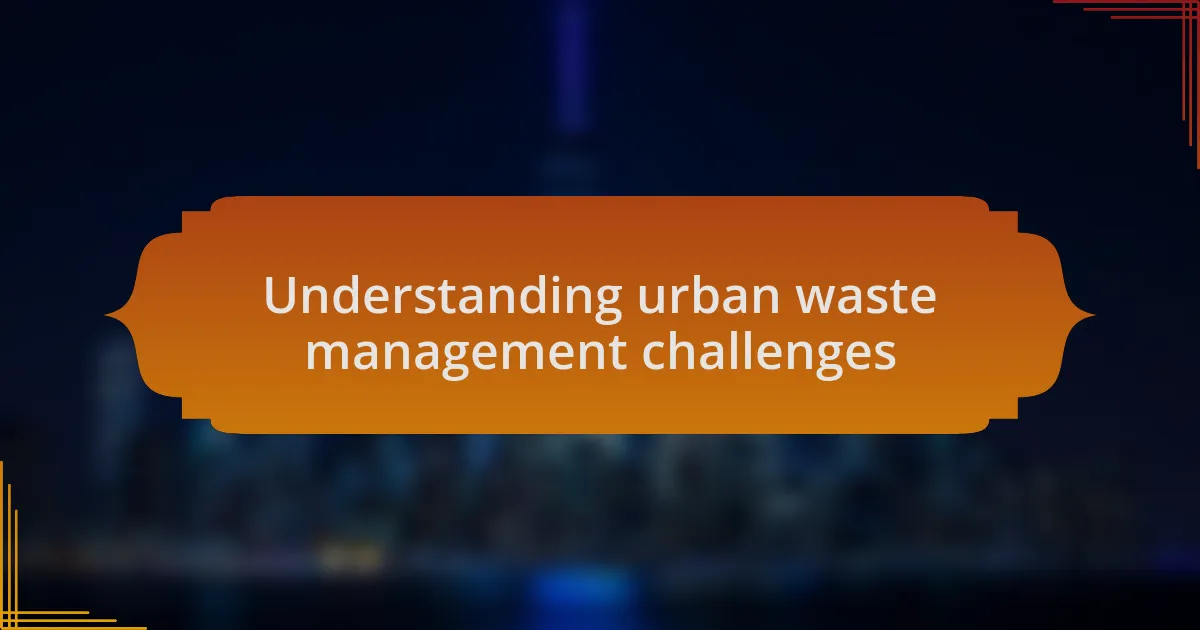
Understanding urban waste management challenges
Urban waste management is a complex puzzle, and I’ve felt the pressure of it quite firsthand. I remember once walking down my local street and being struck by the sheer volume of litter that lay uncollected. It hit me: How do we expect our cities to thrive if we can’t keep them clean? This question leads us to the core challenge—inefficient collection systems that often neglect certain areas.
Moreover, it’s disheartening to see how population growth exacerbates these issues. As our urban centers swell, so does the waste generated, yet the infrastructure often remains stagnant. I’ve watched local initiatives struggle to adapt, feeling the frustration in the community. It makes me wonder, could technology offer us a lifeline to streamline processes?
On another note, let’s not forget the environmental impact. I recall a workshop on urban sustainability where passionate speakers highlighted how neglecting waste management can harm our ecosystems. This emotional connection to the environment resonates deeply with many of us. It raises another critical question: Are we ready to invest in innovative solutions that tackle these various facets of the waste management crisis?
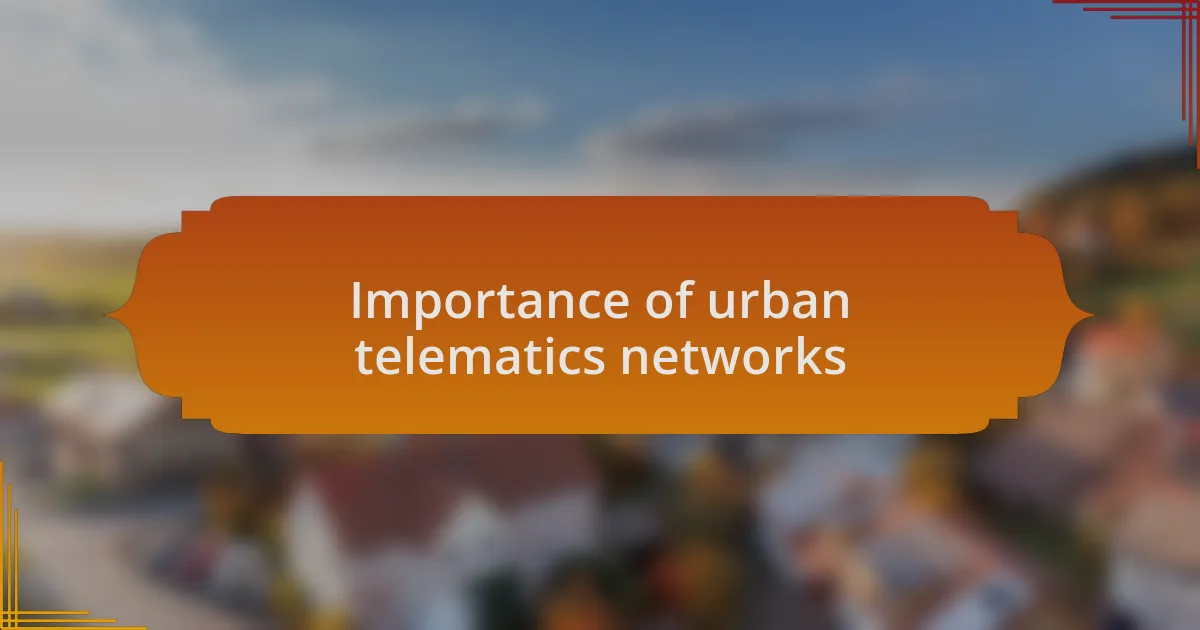
Importance of urban telematics networks
Urban telematics networks play a vital role in enhancing waste management efficiency. I’ve seen firsthand how real-time data can transform collection routes, making them more responsive to the dynamic flows of urban waste. Imagine a city where you’re alerted to the bins that are nearly full, allowing for timely collections instead of missed pickups. Doesn’t that sound like a game-changer?
As I reflect on my experiences, I recognize that effective urban telematics can significantly reduce operational costs. One time, I participated in a city council meeting discussing budget constraints, and it became clear that outdated waste collection methods were draining resources. With a telematics network in place, cities could allocate their budgets more intelligently, optimizing routes and reducing fuel consumption—a win-win, don’t you think?
Moreover, these networks foster community engagement by providing residents with access to information about waste management. I remember a local neighborhood app that updated us on waste collection schedules, which not only kept us informed but also increased our participation. How empowering is it when citizens feel more connected to the systems that keep their environment clean? Urban telematics networks make this possible, bridging the gap between technology and community involvement.
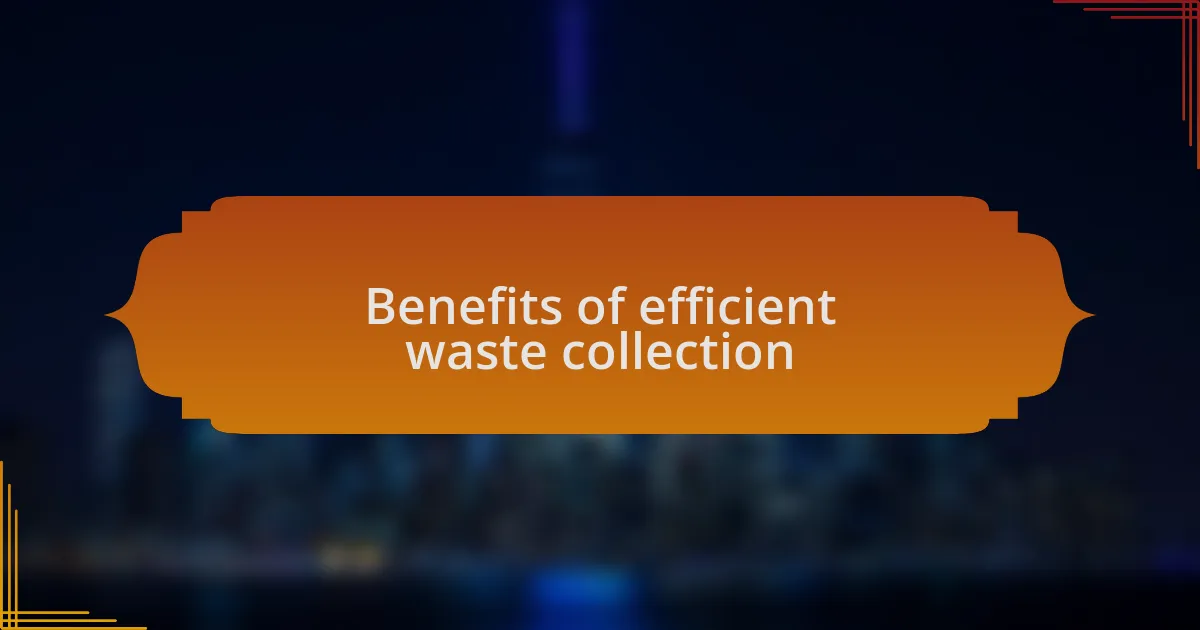
Benefits of efficient waste collection
Efficient waste collection brings a multitude of benefits that directly impact urban living. I recall a time in my neighborhood when scheduled collections meant my street was free of overflowing bins—what an improvement! This not only enhanced the aesthetic appeal but also minimized unpleasant odors and pests. Isn’t it amazing how timely collections can lead to a more pleasant environment for everyone?
Another significant advantage I’ve noticed is the positive effect on public health. When waste is collected efficiently, there’s less chance of attracting vermin and preventing potential hazards. I remember walking my dog and feeling relieved that trash wasn’t piling up on the sidewalks. It made me appreciate how effective waste management contributes to a safer community. How reassuring is it to know that a simple improvement in collection schedules can lead to fewer health risks?
Finally, it’s interesting to see how efficient waste collection can drive recycling rates up. In my experience, when the collection service is reliable and predictable, it encourages more residents to separate recyclables from regular trash. I once had a neighbor who was indifferent to recycling, but after seeing the benefits of a well-organized service, he began participating enthusiastically. Isn’t it inspiring how streamlined operations can spark a shift in community behavior towards sustainability?
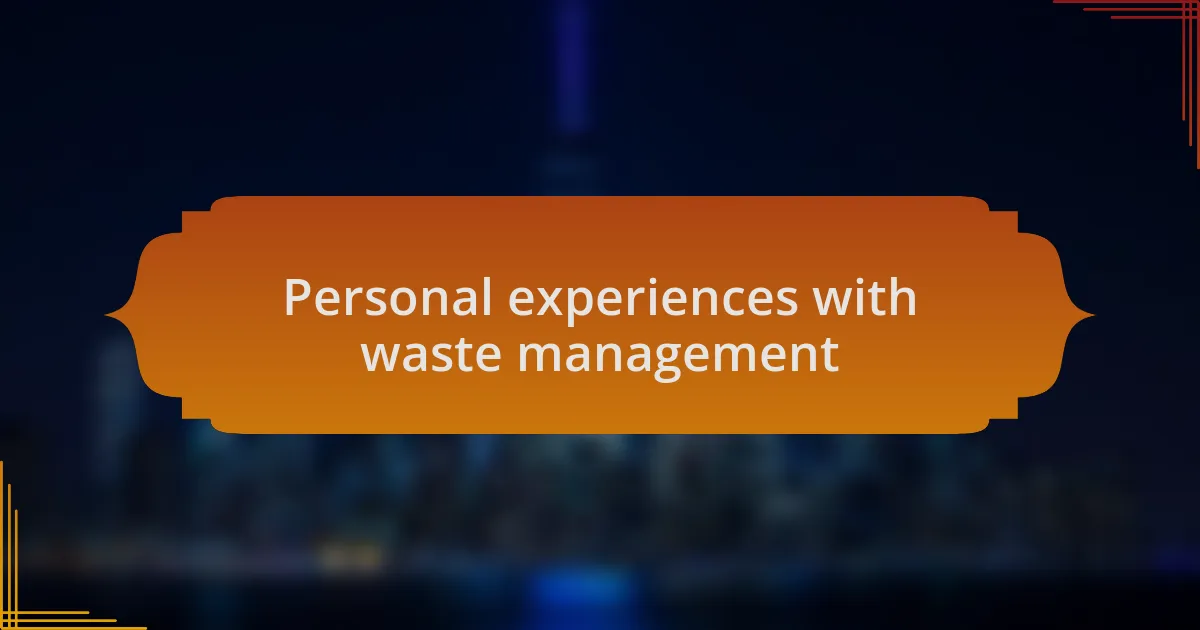
Personal experiences with waste management
On a personal level, I’ve had my fair share of frustrations when it comes to urban waste management. I remember a particularly chaotic week when the trash pick-up was delayed due to a holiday. Our bin overflowed, and I was dismayed to see litter flaring up around the neighborhood. Seeing that mess made me wonder—how do some areas manage their waste so seamlessly, while others struggle?
In another instance, I participated in a community clean-up event aimed at addressing local waste issues. It was both enlightening and uplifting to see residents come together to tackle a problem that affects us all. The camaraderie we shared, as we picked up discarded items and organized our own recycling efforts, truly made me reflect on the collective responsibility we bear. Doesn’t it feel fulfilling to be part of something bigger when working toward a cleaner environment?
Additionally, I’ve observed that even small changes in personal habits can lead to significant impacts. A few months back, I decided to dedicate a section of my kitchen to recycling, complete with clearly labeled bins. Not only did it make recycling easier for me, but I noticed my friends started to follow suit when they visited. Have you ever thought about how simple organization can instill a sense of purpose in waste management?
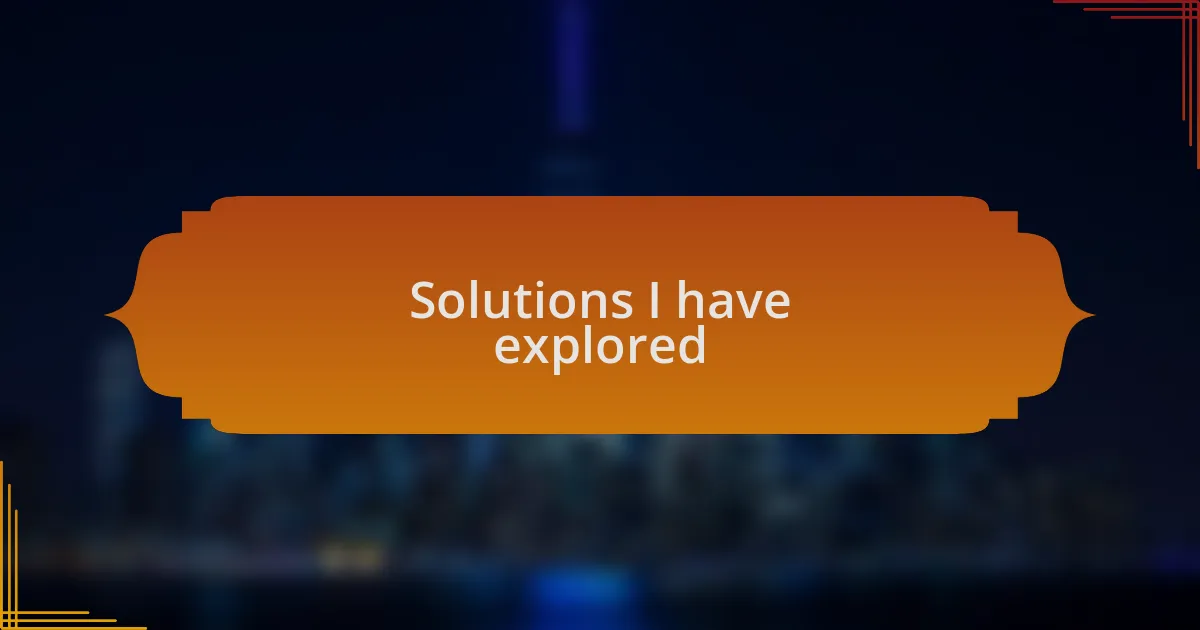
Solutions I have explored
I have explored various solutions and methods that significantly improved my approach to urban waste management. For instance, I attended a workshop on composting, which taught me not just the technique but also the environmental benefits of reducing organic waste. I began composting my kitchen scraps and was pleasantly surprised to see how much waste I could divert from landfills. Have you ever wondered how much good can come from a few apple cores and coffee grounds?
Additionally, I invested time in researching local apps dedicated to waste collection schedules and recycling guidelines. By syncing these notifications with my calendar, I significantly reduced the chances of missed pickups. This small adjustment made a world of difference, transforming a chaotic situation into a more manageable one. Isn’t it amazing how technology can simplify our daily struggles?
Moreover, I collaborated with local businesses to advocate for compostable packaging. One small café agreed to switch from plastic to biodegradable containers after our discussion. This experience reinforced my belief that when individuals and businesses unite for a cause, they can create substantive change. What if more local establishments joined this movement?
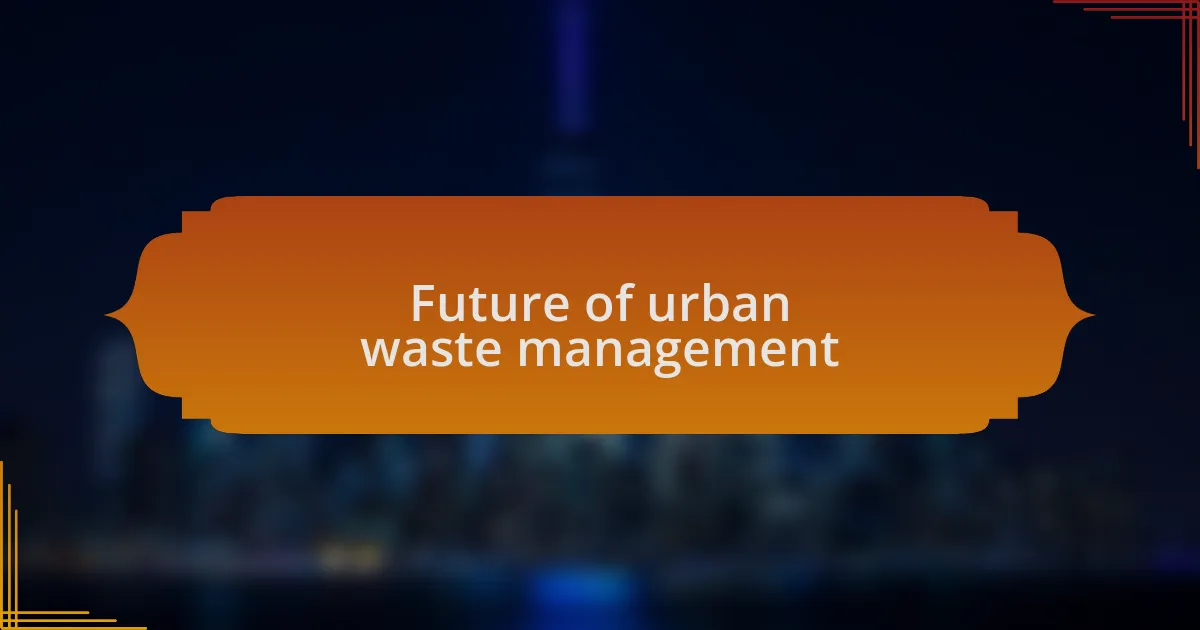
Future of urban waste management
As I look to the future of urban waste management, I’m struck by the potential of smart waste bins equipped with sensors. Imagine a city where these bins can communicate their fill levels in real-time, optimizing collection routes and reducing unnecessary trips. I once watched a demonstration of this technology, and it sparked my curiosity—how much fuel and time could we save by leveraging data in such a straightforward manner?
I also see a trend toward community-centered waste solutions, such as local repair cafes. I vividly remember attending one where neighbors gathered to fix broken items instead of discarding them. It wasn’t just about meeting to mend things; it felt like a powerful community bond was being formed. Can you feel how these gatherings could foster a culture that values sustainability and encourages shared responsibility?
Looking further ahead, the integration of AI in waste sorting could revolutionize recycling efforts. I can’t help but wonder how many valuable materials go unrecycled simply because of human error in sorting. If machines can identify and separate recyclable materials accurately, we could significantly increase recycling rates. Isn’t it exciting to think about how innovation will play a key role in reshaping our relationship with waste?